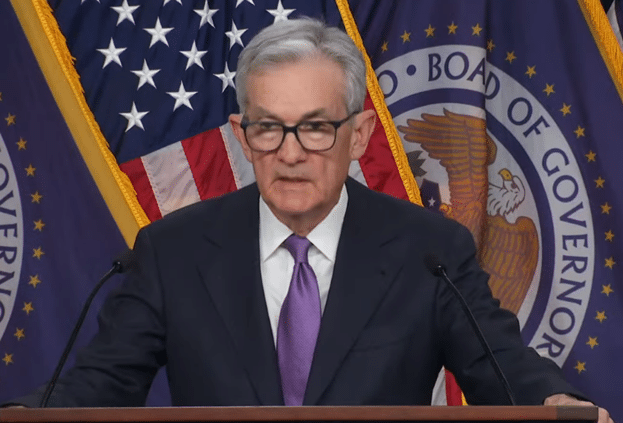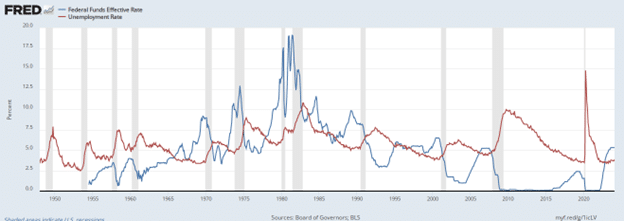March 12, 2024
Permission to republish original opeds and cartoons granted.
Inflation ticks up to 3.2 percent in February amid jump in energy, transportation and shelter prices as Fed weighs interest rate cuts

By Robert Romano
Consumer inflation ticked up 0.4 percent in February to an annual rate of 3.2 percent amid a jump in oil, gasoline, natural gas, transportation and shelter according to the latest data by the Bureau of Labor Statistics.
Gasoline was up 3.8 percent.
Fuel oil was up 1.1 percent.
Natural gas was up 2.3 percent.
Used cars and trucks were up 0.5 percent.
Apparel was up 0.6 percent.
Shelter was up 0.4 percent.
And transportation services were up 1.4 percent.
Although the rate of inflation has indeed slowed down from its 9.1 percent annual peak in June 2022 to its current rate of 3.2 percent, since Jan. 2021 when President Joe Biden took office, overall consumer prices are up almost 18.5 percent.
For comparison, from Jan. 2017 to Feb. 2020, prior to Covid, at that point consumer prices had increased 6.4 percent.
Meaning, what has already been experienced — and is still being felt — is triple what the American people were accustomed to prior to Covid and its resulting $7 trillion printing, borrowing and spending binge by the Federal Reserve and Congress.
In the meantime, the Fed has been holding rates firm at 5.25 percent to 5.5 percent. But in its economic projections released in Dec. 2023, the central bank appears to be anticipating rate cuts to begin sometime this year, which is usually what happens when the economic cycle is ending and unemployment begins to rise, projecting the Federal Funds Rate to drop to 4.6 percent this year.

But that might change with the latest reading from the Bureau of Labor Statistics. On March 6, Federal Reserve Chairman Jerome Powell told Congress that the central bank wants to be certain inflation is headed back to its “normal” 2 percent a year bearing: “In considering any adjustments to the target range for the policy rate, we will carefully assess the incoming data, the evolving outlook, and the balance of risks… The Committee does not expect that it will be appropriate to reduce the target range until it has gained greater confidence that inflation is moving sustainably toward 2 percent.”
This could indicate the Fed wants to get inflation down as far as possible before making any moves, and although the unemployment rate is off its historic low of 3.4 percent in April 2023 to its current rate of 3.9 percent in February, the Board of Governors is not panicking. As unemployment moves up, that is usually when the Fed will begin cutting rates as the cycle ends.
The fear could be that once the economic slowdown or recession is realized, unemployment will temporarily jump up, the Fed will cut rates and then robust inflation could be restored very quickly. For years, Biden has rejected there being any necessary tradeoffs between inflation and unemployment, but as the Fed keeps rates higher than the rate of consumer inflation and 898,000 jobs have been lost out of the household survey since Nov. 2023 that hypothesis will soon be tested.
Robert Romano is the Vice President of Public Policy at Americans for Limited Government Foundation.
Video: Bill Walton Show: It’s Time to Leave the WHO with Reggie Littlejohn and Meryl Nass

To view online: https://www.youtube.com/watch?v=PtqGyQ-59vE


Terry Jones: Voters See Double Standard In Trump Charges For Mishandling Classified Documents: I&I/TIPP Poll
85% want the transcripts of Special Counsel Hur's interview with President Biden to be released to the public.
By Terry Jones
Special Counsel Robert Hur found that President Joe Biden for decades broke laws by hoarding classified records, but refused to bring charges against him. Yet, former President Donald Trump faces charges for keeping classified items at his Mar-a-Lago home. The I&I/TIPP Poll asked voters: Is this a double standard? Their answer? "Yes."
To start with, I&I/TIPP asked the poll's 1,419 respondents whether they were following the Hur investigation "very closely," "somewhat closely," "not very closely," "not at all closely," and "not sure."
Only those responding with the first two answers, "very closely" or "somewhat closely," were counted. That totaled 568 people, or roughly 40% of all those who took the poll.
From there, the poll was broken into multiple questions. The first:
"Special Counsel Robert Hur concluded that no charges should be brought against President Biden for mishandling classified documents, citing his well-meaning nature and failing memory. Considering these factors, do you agree or disagree that Hur's decision not to bring charges against President Biden was lenient?"
Among those who were paying close attention to the story, a clear 57% majority said they either agreed strongly (36%) or somewhat (21%) that Biden received lenient treatment. Another 37% said they disagreed somewhat (12%) or strongly (25%). Just 6% said they weren't sure.
Here's where it gets interesting. Among Democrats, 69% called Biden's treatment "lenient," while 27% disagreed. But only 50% of Republicans agreed, while 46% disagreed. Independents broke 53% agree, 39% disagree.
A follow-up question asked "when comparing the handling of classified document cases, the Department of Justice has been," followed by three possible responses. "More lenient toward President Biden than to President Trump"; "More lenient toward President Trump than to President Biden;" and, "Not sure."
The majority widened for the second question, with 62% answering that DOJ had been "more lenient" with Biden than with Trump, while only 24% said Trump had been treated with more leniency. Another 14% responded "not sure."
Across all political parties, there was either a plurality or outright majority saying that DOJ had played favorites in how it charged the two likely candidates for president. For Democrats, it was 47% saying Biden's treatment was more lenient than Trump's, while 33% said Trump's treatment was more lenient.
For Republicans, the same questions elicited 79% saying Biden got more lenient treatment, versus just 16% saying Trump did. Independents came in at 59% Biden and 21% Trump.
In short, Americans focused on Hur's investigation of Biden's mishandling of classified documents are mostly convinced that the Department of Justice's efforts show a clear double standard when applying federal law in this case.
Hur's investigation of Biden's mishandling and possibly illegal possession of confidential records came under congressional scrutiny after the committee looking into whether Biden should be impeached subpoenaed the Justice Department for transcripts or audio recordings of Hur's interviews with Biden.
Despite the subpoena, however, the Justice Department has refused to hand over the requested documents to Congress, missing a March 7 deadline for doing so and setting up a clash of jurisdictions between the legislative and executive branches of the federal government.
"We received a small production from DOJ but not the transcripts or audio that we need and requested," Russel Dye, the House Judiciary Committee spokesman, told Fox News last week. "Our staff has all necessary clearances to review the contents of the president’s interview, which dealt with materials found in unsecured areas like garages, closets and commercial office space. We are evaluating next steps."
How do American voters feel? I&I/TIPP asked the following question of voters responding to the poll: "To what extent to you agree or disagree? The transcript of Special Counsel Hur's interview with President Biden must be released to the public."
The possible answers included "agree strongly," "agree somewhat," "disagree somewhat," "disagree strongly," and "not sure."
The message was clear: 85% said they either agreed "strongly" (57%) or "somewhat" (28%) that the transcripts of Hur's interview with Biden should be released to the public. Just 9% disagreed either "somewhat" (6%) or "strongly" (3%). Only 6% were "not sure."
There was strong partisan agreement across the board, showing Dems (78% agree, 14% disagree), Republicans (94% agree, 4% disagree) and independents (83% agree, 10% disagree) all pretty much singing the same tune: Release the transcripts.
No doubt, pressure will build to release the transcripts of Biden's interview in the coming weeks.
Hur is scheduled to go before Congress for further questioning on March 12. He's likely to get tough questioning from both sides of the aisle, given his description of Biden in his official report as a "sympathetic, well-meaning elderly man with a poor memory," which angry Democrats claim has damaged Biden's reelection chances.
Meanwhile, unlike Biden, Trump still faces federal charges for retaining and mishandling classified documents. His attorneys are expected to present arguments on two motions to dismiss the charges at a March 14 hearing in Florida.
Trump's attorneys will argue that the 1978, post-Watergate era Presidential Records Act allows presidents to hold on to personal records, and that he is immune from prosecution in the case because he was still serving as president when the records were removed.
They will also argue that Trump is being "selectively prosecuted," a defense that might reverberate given the government refusal to charge Biden for doing basically the same thing, both as a senator for 36 years and as vice president for eight years.
Along with the other major prosecutions against Trump that have been launched over the last two years, the federal charges for mishandling classified documents are serious allegations. But Americans clearly see an imbalance in how Biden and Trump have been treated in this case, which could well have an impact on the outcome of the 2024 election.
I&I/TIPP publishes timely, unique, and informative data each month on topics of public interest. TIPP’s reputation for polling excellence comes from being the most accurate pollster for the past five presidential elections.
To view online: https://tippinsights.com/voters-see-double-standard-in-trump-charges-for-mishandling-classified-documents-i-i-tipp-poll/
